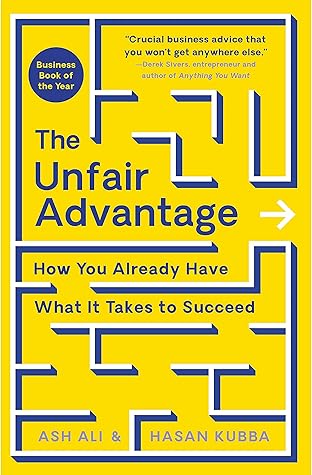More on this book
Community
Kindle Notes & Highlights
by
Ash Ali
Read between
August 13 - August 15, 2022
In Fooled by Randomness, the statistician Nassim Nicholas Taleb writes that “mild success can be explainable by skills and labor. Wild success is attributable to [statistical] variance.” (Taleb calls luck “variance.”) So we have to bear in mind all the things outside of our control.
An Unfair Advantage is a condition, asset, or circumstance that puts you in a favorable business position.
Your Unfair Advantages can’t easily be copied or bought.
Your set of Unfair Advantages is unique to you.
For any early-stage startup, the Unfair Advantage of that startup is the sum of the individual Unfair Advantages of the founders.
Your Unfair Advantage is your personal economic moat
Competitive advantages vs. Unfair Advantages
Your Unfair Advantage is your leverage
Your Unfair Advantages can build on each other
Unfair Advantages give you speed
The opposite of this fixed mindset is a growth mindset. This is when a person believes that all of life is fluid. Yes, you can be bad at something, but it is only because you have not taken the time or attention to get better at it. The growth mindset is perfectly encapsulated in one word: “yet.” “I can’t write code … yet.” “I can’t write a business plan … yet.” “I can’t find a co-founder … yet.” This three-letter word opens up a whole realm of possibilities.
A reality-growth mindset is the ability to accept the hard limits of the way things are (like the physical laws of the universe) and also to believe that anything is possible (the metaphysical way of looking at the universe). It acknowledges that there are limitations, but that those limitations are more malleable than people may think.
Four characteristics of a strong Reality-Growth Mindset
1. Vision
2. Resourcefulness
3. Constant growth and lifelong learning
4. Grit and perseverance
Money as a cushion
Money as your Unfair Advantage
Here are just a few other suggestions, some of which focus on the most monetizable skills, others that look at ways of increasing your income:
Minimize living expenses
Learn marketing and sales
Raise funding
Learn to code
Freelance
According to many reputable studies, children who score higher on IQ tests will, on average, go on to do better in the conventional measures of success in life: academic achievement and economic success. These children are also more likely to have better health and a longer life.
So, while we see correlations between IQ and success on a broad scale in society, this information is actually not useful to us individually.
So, while it does have some predictive ability over a large population, and may therefore be useful in policy considerations, for us as individuals IQ is not useful.
Ask yourself: How well do you work in teams? How good are you in your interpersonal relationships? Do you make others around you feel better about themselves? Are you in touch with your own emotions? Can you get a good gut feeling of what other people’s intentions are? In other words, can you often sense if somebody has bad intentions?
Overall, to develop your Intelligence and Insight, you have to: Cultivate your curiosity. Ask more questions. Do more experiments. Be more interested in how people feel, and the emotional impact things have on them. Notice when people say something is a pain to do, or is inconvenient. These are gold mines for valuable insights (more about this in Chapter 14: The Idea). Be more aware of your own emotions and moods, and don’t let them dictate your actions.
In his book The Luck Factor, Wiseman identifies four basic principles that lucky people use to create good fortune in their lives.
1. Maximize your chance opportunities
2. Trust your intuition and gut feeling, especially when you’ve had some experience
3. Expect to be lucky
4. Turn even the bad luck into good luck
Take more action. Do more things. Meet more people. Go to more events. Blog about your startup. Produce things and publish them. Get feedback. Put more stuff out into the world.
When we meet people in their early twenties, we always advise them not to pick the job that necessarily pays the most, but the one where they can learn the most.
Ask yourself: Do I have the skills to build my company? Do I know what I am an expert in? What would I like to be an expert in?
If you feel as if you don’t yet have an expertise in anything, then you can build it in a variety of ways:
Learning online
Books
Mentors
Doing it yourself
Another way to solidify expertise is to teach what you know, whether face to face or by writing up an article or recording a teaching video. It helps you learn it twice.
However, any small business can be seen through a startup lens, and many digital and technology startups are actually lifestyle businesses. Here are a few examples: Mobile app development agency Social media marketing agency Search engine marketing consultancy YouTube comedy channel Online news media publication Niche software and app startups Online T-shirt business Online affiliate marketing and drop-shipping
You start with whatever amount of innate “talent” you’re born with, but hard work can beat talent when talent doesn’t work hard.
I am lucky enough to have had this instilled in me by my parents—to always seek ways of helping before asking for help.
Here are some tips on finding a mentor:
1. Identify who could be a good mentor for you.
2. Get their attention—break through the noise.


